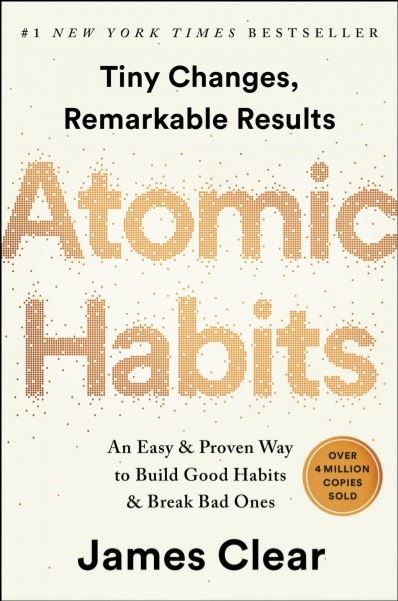The Reading Room

Atomic Habits
James Clear
Published: 2018, Random House Business
I
James Clear’s book Atomic Habits overriding theme is the concept that even one minor change, practiced daily, can lead to drastic changes in peoples’ lifestyles. He explains how while some habits may be as minuscule as an atom, the accumulation of these atomic habits can bring a notable change in one’s lives.
The book provides a detailed methodology to build good habits and break bad ones and introduces four laws to achieve the above- Make it obvious (Cue), Make it attractive (craving), Make it easy (response) and make it satisfying (reward). He introduces the cue, craving, response, and reward matrix which is the backbone of atomic habits and the path to build good and break bad habits. In short, cue triggers craving, which motivates a response, which provides a reward, which satisfies the craving and becomes associated with the cue.
1st Law- Make it obvious (Cue) – Every habit is initiated by a cue. We are more likely to notice cues that stand out. Make the cues of good habits obvious in your environment. Gradually, your habits become associated not with a single trigger but with the entire context surrounding the behaviour. The context becomes the cue.
2nd Law- Make it attractive (craving) – The more attractive an opportunity is, the more likely it is to become habit-forming. Habits are a dopamine- driven feedback loop. When dopamine rises, so does our motivation to act. It is the anticipation of a reward- not the fulfilment of it- that gets us to act. The greater the anticipation, the greater the dopamine spike and chance of us making a good habit. And contra to this, highlight the benefits of avoiding a bad habit to make it unattractive.
3rd Law- Make it easy (response) – Human behaviour follows the Law of Least Effort. We will naturally gravitate toward the option that requires the least amount of work. Create an environment where doing the right thing is as easy as possible. Reduce the friction associated with good behaviours and vice versa for bad. When frictions are less habits are easy to develop.
4th Law- Make it satisfying (reward) – We are more likely to repeat a behaviour when the experience is satisfying. The human brain evolved to prioritize immediate rewards over delayed rewards. The Cardinal rule of Behaviour Change: What is immediately rewarded is repeated. What is immediately punished is avoided. The first three laws of behaviour change – make it obvious, make it attractive and make it easy- increase the odds that a behaviour will be performed this time. The fourth law increases the odds that a behaviour will be repeated next time.
The author concludes with the Greek parable known as Sorites Paradox. If you give a person a pile of ten coins, you would not claim that he or she is rich. But what if you add another? And another? Similarly, can one tiny change transform your life? But what if we add another? And another? Each improvement is like a adding a grain of sand to the positive side of the scale, slowly tilting things in our favour. If we stick to this, we are hitting a tipping point and are likely stick with good habits.
The book makes for a fantastic read, with not just numerous examples of people who made small changes to achieve big in life, but an easy to follow four laws to transform our lives. To breaking bad and building good! Cheers
Ritika Behera
May 2022
The information contained above and in other entries in the Ocean Dial Book Review Series is intended for general information and entertainment purposes only, and should not be relied upon in making, or refraining from making, any investment decisions. No information provided herein should or can be taken to constitute any form of advice or recommendation as to the merits of any investment decision. You should take independent advice from a suitably qualified investment adviser before making any investment decisions.
The CEO Factory: Management Lessons from Hindustan Unilever
Published: 2019, Juggernaut Books
For six decades Hindustan Unilever has remained among India’s top five most valuable companies. No other Corporation in the world has done so well for so long. For the first time comes a book that decodes how this great business works – from a director of the company who has spent his whole career there.
Seven Decades of Independent India: Ideas and Reflections
Published: 2022, Penguin Books India
Has democracy in India fulfilled the aspirations of its people? Have institutions delivered? Have public policies succeeded in making substantial differences to living standards? Is the country secure on its external borders? Would the country become an economic powerhouse? And can India be a leading power in the years ahead?
Ikigai – The Japanese Secret to a Long and Healthy Life
Published: 2016, Cornerstone
We all have an ikigai. It’s the Japanese word for ‘a reason to live’ or ‘a reason to jump out of bed in the morning’. It’s the place where your needs, desires, ambitions, and satisfaction meet. A place of balance. Small wonder that finding your ikigai is closely linked to living longer.


